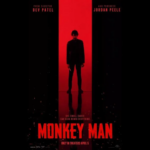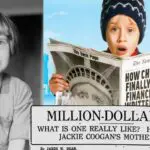Table of Contents
Still Kicking
The recently released ‘Karate Kid: Legends’ marks the sixth feature film installment in the ‘Karate Kid’ franchise. But this is by no means the sudden rebirth of a dormant property– it’s the latest chapter in a long, winding saga of reboots, remakes, and reimaginings (oh my!) that has been intermittently simmering for decades. In fact, ‘Legends’ may say less about the enduring popularity of ‘The Karate Kid’ itself and more about the broader cultural obsession with nostalgia- and how Hollywood continues to exploit it.
The ‘Karate Kid’ franchise has never truly vanished. After the original trilogy centered on Daniel LaRusso (Ralph Macchio)- ‘The Karate Kid’ Parts I (1984), II (1986), and III (1989)– there came ‘The Next Karate Kid’ in 1994. That film attempted to reinvigorate the formula by introducing a new protagonist, Julie Pierce, played by a young Hilary Swank. While the film was critically underwhelming and, on its own merits, rather mediocre, it did offer something new: a female lead- and thus a different dynamic with Mr. Miyagi (reprised by the indelible Pat Morita)- as well as a more internal, introspective struggle for the protagonist to confront. It didn’t reinvent the wheel, but it did try turning it in a slightly different direction.
Fast-forward to 2010, and Hollywood opted for a full-on reboot. Starring Jackie Chan and Jaden Smith, the ‘Karate Kid’ remake updated the setting to China and leaned into kung fu rather than karate. However, aside from these slight adjustments, the film was formulaic by virtue of its homogenous story beats. A teenager moves to a new town. The kid is awkward, makes a few friends, develops a love interest, and eventually gets entangled with a group of martial-arts-trained bullies. Training montage, mentorship, and climactic tournament ensue.
Things to do:
- Subscribe to The Hollywood Insider’s YouTube Channel, by clicking here.
- Limited Time Offer – FREE Subscription to The Hollywood Insider
- Click here to read more on The Hollywood Insider’s vision, values and mission statement here – Media has the responsibility to better our world – The Hollywood Insider fully focuses on substance and meaningful entertainment, against gossip and scandal, by combining entertainment, education, and philanthropy.
The ‘Cobra Kai’ Surprise
At that point, it seemed the ‘Karate Kid’ brand might finally be put to bed. But in 2018, something unexpected happened.
Originally launched as a YouTube Premium original series, ‘Cobra Kai’ surprised everyone by being not just watchable, but genuinely good. It’s premise was intriguing- following the once-villainous Johnny Lawrence (William Zabka) in the modern day- and turned it into a compelling character drama with high school brawls, midlife crises, and just enough cheesy nostalgia to work. When Netflix picked up the series for its second season, its popularity exploded. Suddenly, a franchise that had been in pop culture’s rearview mirror was center stage again.
In an interview with the Television Academy, ‘Cobra Kai’ co-creator Josh Heald (along with Jon Hurwitz and Hayden Schlossberg) explained that the team has “a lot of ideas about where [they] can take this story in another iteration,” adding, “the franchise has never been more vibrant.” And for a time, that seemed true. The show earned nine Primetime Emmy nominations across multiple categories and was praised for doing what few legacy properties manage: expanding the original story while offering something fresh.
What made ‘Cobra Kai’ work was that it cleverly subverted the original series’ perspective. The first ‘Karate Kid’, directed by John G. Avildsen, rode the wave of underdog sports films in the wake of ‘Rocky’– which Avildsen also directed. It was a simple, satisfying formula: a bullied kid learns self-respect and discipline through martial arts. But by the time ‘Cobra Kai’ arrived, Daniel LaRusso was no longer the underdog. He was a successful car dealership owner with a nice home and family. The underdog now? Johnny Lawrence, washed-up, alcoholic, and still haunted by his teenage mistakes.
By shifting the narrative, ‘Cobra Kai’ breathed new life into an old tale. It capitalized on the audience’s nostalgia while still offering a modern, grounded story that felt emotionally relevant. The show managed to honor the past without being handcuffed by it.
But that’s precisely where ‘Karate Kid: Legends’ stumbles.
WATCH THE TRAILER of the Film and the Revolution: ‘Can I Go Home Now?’
The Children Around the World Continue to Ask the question
The Business of Familiarity
‘Karate Kid: Legends’ brings together franchise veterans Ralph Macchio and Jackie Chan, creating a multiverse-style crossover reminiscent of ‘Spider-Man: No Way Home.’ The film also introduces Ben Wang, known for his role in Disney+’s ‘American Born Chinese’, as the newest lead in the franchise. This installment uniquely connects previously separate storylines within the Karate Kid universe. According to Collider, the film recouped its modest $45 million production budget during its opening weekend, signaling a strong box office debut. A budget-conscious approach like this appears to be a smart strategy, especially when compared to films like ‘Thunderbolts*’, which- despite sparking major enthusiasm among the Marvel fans – is projected to, at best, break even (Screenrant).
In ‘Legends’, we’re back to the same formula. A teenager moves to a new town. The kid is awkward, makes a few friends, develops a love interest, and eventually gets entangled with a group of martial-arts-trained bullies. Training montage, mentorship, and climactic tournament ensue. It’s essentially a beat-for-beat retread of the original 1984 film. The only true detour ‘Legends’ makes from the traveled path of the formula is that it also deals the internal struggle of the titular karate kid- Li Fang. Which, as aforementioned, was a key aspect of ‘The Next Karate Kid.’
This isn’t homage. This is a mad lib.
It feels lazy, even cynical, when a story as iconic as ‘The Karate Kid’ is rehashed without any genuine attempt to say something new. It’s like taking a mulligan on a hole-in-one- you already achieved perfection, so why pretend you can replicate the same magic under identical circumstances? Why not try something bolder?
The irony is, there are hundreds- if not thousands- of older, lesser-known properties from film history that flopped or were forgotten, despite having interesting ideas. If Hollywood wants to revisit the past, why not dig into those archives? Take a failed concept, apply modern storytelling tools, fix the structural problems, and make a genuinely fresh film. Rewriting is often easier than writing, especially with hindsight.
Instead, studios stick to the same handful of brands. Because in their eyes, it’s not about creativity- it’s about risk management. As movies become more expensive to produce, the need for a guaranteed audience becomes more urgent. And legacy titles, even those with stale plots, offer a form of insurance. They don’t have to be good. They just have to be familiar.
That’s the paradox of the modern nostalgia craze. Audiences are clearly growing weary of endless sequels, reboots, and re-imaginings. And yet, many still flock to them. It’s comfort food. Safe, predictable, and digestible. But at what cost?
Related article: Want GUARANTEED SUCCESS? Remove these ten words from your vocabulary| Transform your life INSTANTLY
Related article: Streaming Services Are Killing Movie Theaters
Hindsight in the 2020s
Do we lose originality entirely when the only things getting greenlit are things we’ve seen before?
And what does it say about our culture when the most bankable cinematic idea is to just do the same thing, again and again, slightly rebranded?
I wonder if we can even call legacy sequels cash grabs anymore. It feels like we’ve entered a new era- one where studios aren’t even hiding their intentions. Nostalgia is the business model. From ‘Star Wars’ to ‘Ghostbusters’ to ‘Indiana Jones’, and now back to ‘The Karate Kid’, it’s all about emotional familiarity over narrative innovation.
To be clear, this isn’t a knock against nostalgia itself. There’s power in revisiting formative stories, in exploring how beloved characters have changed over time. But that only works when there’s a purpose beyond the brand. ‘Cobra Kai’ had a point of view. ‘Legends’ just has a template.
The studio might still profit. And maybe some younger audiences will find meaning in it. But for fans who’ve watched this story unfold over four decades, it feels more like a tired performance than a revival.
So where does that leave us?
Stuck in a cycle where “new” films are really just shadow plays of past hits, sometimes entertaining, but rarely memorable. If we keep remaking yesterday’s stories, we risk forgetting how to tell tomorrow’s.
Related article: EVOLUTION: Every Ryan Gosling Role From 1995 to 2020, All Performances Exceptionally Poignant
Related article: EVOLUTION: Every Henry Cavill Role From 2001 to 2021, All Performances Exceptionally Poignant
Related article: All Best Actor/Actress Speeches From The Beginning Of Oscars 1929-2019 | Hollywood Insider
By Joseph Tralongo
Click here to read The Hollywood Insider’s CEO Pritan Ambroase’s love letter to Cinema, TV and Media. An excerpt from the love letter: The Hollywood Insider’s CEO/editor-in-chief Pritan Ambroase affirms, “We have the space and time for all your stories, no matter who/what/where you are. Media/Cinema/TV have a responsibility to better the world and The Hollywood Insider will continue to do so. Talent, diversity and authenticity matter in Cinema/TV, media and storytelling. In fact, I reckon that we should announce “talent-diversity-authenticity-storytelling-Cinema-Oscars-Academy-Awards” as synonyms of each other. We show respect to talent and stories regardless of their skin color, race, gender, sexuality, religion, nationality, etc., thus allowing authenticity into this system just by something as simple as accepting and showing respect to the human species’ factual diversity. We become greater just by respecting and appreciating talent in all its shapes, sizes, and forms. Award winners, which includes nominees, must be chosen on the greatness of their talent ALONE.
I am sure I am speaking for a multitude of Cinema lovers all over the world when I speak of the following sentiments that this medium of art has blessed me with. Cinema taught me about our world, at times in English and at times through the beautiful one-inch bar of subtitles. I learned from the stories in the global movies that we are all alike across all borders. Remember that one of the best symbols of many great civilizations and their prosperity has been the art they have left behind. This art can be in the form of paintings, sculptures, architecture, writings, inventions, etc. For our modern society, Cinema happens to be one of them. Cinema is more than just a form of entertainment, it is an integral part of society. I love the world uniting, be it for Cinema, TV, media, art, fashion, sport, etc.
More Interesting Stories From The Hollywood Insider
– Want GUARANTEED SUCCESS? Remove these ten words from your vocabulary| Transform your life INSTANTLY
– A Tribute to Martin Scorsese: A Complete Analysis of the Life and Career of the Man Who Lives and Breathes Cinema
– Do you know the hidden messages in ‘Call Me By Your Name’? Find out behind the scenes facts in the full commentary and In-depth analysis of the cinematic masterpiece
– A Tribute To The Academy Awards: All Best Actor/Actress Speeches From The Beginning Of Oscars 1929-2019 | From Rami Malek, Leonardo DiCaprio To Denzel Washington, Halle Berry & Beyond | From Olivia Colman, Meryl Streep To Bette Davis & Beyond.
– In the 32nd Year Of His Career, Keanu Reeves’ Face Continues To Reign After Launching Movies Earning Over $4.3 Billion In Total – “John Wick”, “Toy Story 4”, “Matrix”, And Many More

Joseph Tralongo is a playwright and screenwriter who approaches storytelling with a deep respect for film’s ability to distill human behavior into meaningful moments. His personal work- i.e. his plays, screenplays, and films- leans into semantic tension, moral ambiguity, and the quiet unraveling of social dynamics- not to preach, but to parse. For him, writing is a slow excavation of truth through craft. With a background in theatre and independent film, he brings a structural precision and dramatic instinct to every film he reviews. Hollywood Insider’s mission to champion substance over spectacle aligns with Joseph’s belief that storytelling should investigate, not dictate.








